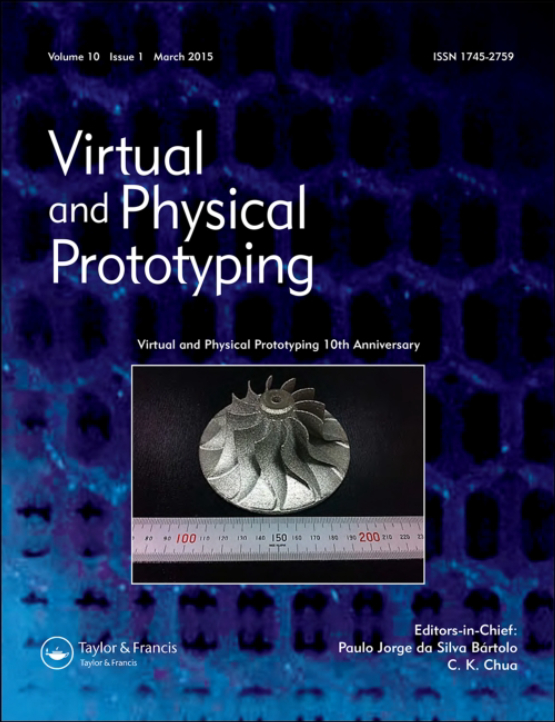Submit a Manuscript to the Journal
Virtual and Physical Prototyping
For an Article Collection on
Advancing 3D Printing of Soft, Smart, and Multi-material Systems
Manuscript deadline


Article collection guest advisor(s)
Dr. Gianni Stano,
Polytechnic of Bari, Italy
gianni.stano@poliba.it
Dr. Yonas Tadesse,
UT Dallas, TX, USA
yonas.tadesse@utdallas.edu
Dr. Trevor J. Fleck,
Baylor University, TX, USA
trevor_fleck@baylor.edu
Dr. Ali Zolfagharian,
Deakin University, Australia
a.zolfagharian@deakin.edu.au
Advancing 3D Printing of Soft, Smart, and Multi-material Systems
Biological structures are characterized by three fundamental elements: i) Soft segments (e.g., skin), ii) Sensing systems (e.g., the nervous system), iii) Rigid-soft interfaces (e.g., the musculoskeletal system). These features enable biological systems to absorb loads, adapt to unknown environments, perform complex movements, and support high payloads. Such capabilities hold significant appeal across various fields, including humanoid robots, prosthetic devices (e.g., hands), soft robotics, auxetic devices, and objects with embedded sensing systems.
Additive Manufacturing (AM) technologies have emerged as promising tools for replicating these natural attributes. In particular, Material Extrusion (MEX), encompassing filament-, pellet-, and ink-based variants, and Material Jetting (MJ) have shown exceptional potential. These technologies allow for the simultaneous processing of multiple materials in a single manufacturing cycle, enabling the creation of sophisticated structures. Moreover, MEX and MJ techniques support a broad spectrum of materials, ranging from highly soft materials (e.g., silicone and thermoplastic polyurethane) to extremely stiff ones (e.g., carbon- and glass-fiber-filled composites) and electrically conductive materials (e.g., carbon-nanotube-filled polymers). This versatility opens new possibilities for fabricating soft, multi-material, and sensor-integrated structures.
This Collection seeks to advance research on the 3D printing of soft, smart, and multi-material structures. Submissions are invited across a range of paper types, including Original Papers, Letters to the Editor, Review Papers, Short Communications, and Mini-Reviews. Contributions utilizing experimental, numerical, or multidisciplinary approaches are highly encouraged.
The main topics of this Collection include, but are not limited to:
- Advancing 3D printing of soft structures, such as soft robots and prosthetic devices.
- Exploring new insights into interface adhesion of dissimilar materials in multi-material 3D printing.
- Advancing 3D printing of sensors: fabrication setups, materials (selection and creation ex-novo), sensor design, and embedding strategies.
- Modeling 3D printing processes for soft and rigid material extrusion.
- Advancing the fabrication of bio-inspired systems, such as musculoskeletal systems.
- Exploring 4D printing approaches for creating plug-and-play objects.
Keywords: Soft materials; 4D printing; Multi-material; 3D printed sensors; Material Extrusion
All manuscripts submitted to this Article Collection will undergo a full peer-review; the Guest Advisor for this Collection will not be handling the manuscripts (unless they are an Editorial Board member).
Please review the journal scope and author submission instructions prior to submitting a manuscript.
The deadline for submitting manuscripts is [31 October 2025].
Please contact Zhan Yu at zhan.yu@taylorandfrancis.com with any queries and discount codes regarding this Article Collection.
Please be sure to select "Advancing 3D Printing of Soft, Smart, and Multi-material Systems" from the drop-down menu in the submission system.
Dr Gianni Stano is an assistant professor of Mechanical Engineering at the Polytechnic of Bari, Italy. He was a visiting PhD student at the University of Texas at Dallas, USA in 2021-2022, and postdoctoral research fellow at Baylor University, USA in 2022-2023. His main research topic is the advancement of Material Extrusion 3D printing (both filament, and ink) for the fabrication of one-shot soft robots with embedded sensing units.
Dr. Yonas Tadesse is a Professor of Mechanical Engineering at the University of Texas at Dallas. His research focuses on artificial muscles, humanoid robotics, smart materials, sensors/actuators, additive manufacturing, mechatronic systems, multimodal energy harvesting, modeling, controls, soft robotics and biomimetics.
Dr. Trevor J. Fleck is an assistant professor in the Department of Mechanical Engineering at Baylor University. His research focuses on various aspects of the additive manufacturing (AM) process, including novel materials development, multi-material adhesion mechanisms, in situ process monitoring, and AM component qualification through non-destructive evaluation. His experience in additive manufacturing spans multiple AM techniques, primarily focusing on fused filament fabrication, direct ink writing, and direct energy deposition.
Dr. Ali Zolfagharian is recognized for his innovative direction in 4D printing soft robots and smart material additive manufacturing technologies. He is the co-founder of the 4D Printing Society, editor-in-chief of 4D Printing journal, and recipient of the Australian Research Council's (ARC) Discovery Early Career Research Award (DECRA), co-editor of the Smart Materials in Additive Manufacturing book series, and publish over 150 journal articles, 15 special issues, 8 book chapters, and 6 books.
Benefits of publishing open access within Taylor & Francis
Global marketing and publicity, ensuring your research reaches the people you want it to.
Article Collections bring together the latest research on hot topics from influential researchers across the globe.
Rigorous peer review for every open access article.
Rapid online publication allowing you to share your work quickly.
Submission Instructions
All manuscripts submitted to this Article Collection will undergo desk assessment and peer-review as part of our standard editorial process. Guest Advisors for this collection will not be involved in peer-reviewing manuscripts unless they are an existing member of the Editorial Board. Please review the journal Aims and Scope and author submission instructions prior to submitting a manuscript.
